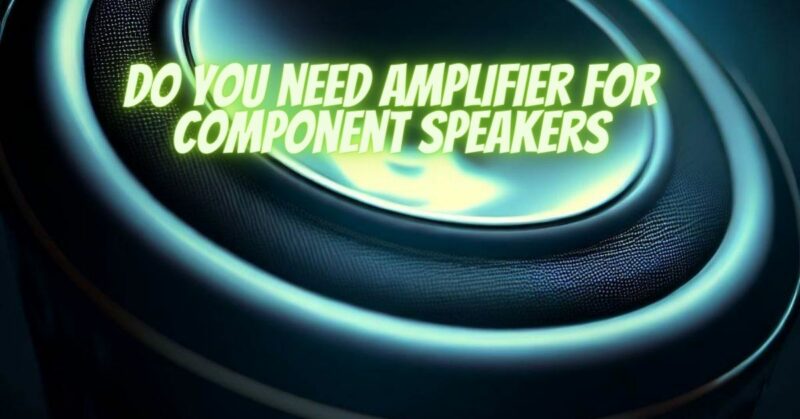Component speakers, known for their superior sound quality and flexibility, have become a popular choice for discerning audio enthusiasts and car audio systems. To fully harness the capabilities of component speakers and elevate your audio experience, the question arises: Do you need an amplifier for component speakers? In this article, we will explore the importance of amplifiers in driving component speakers and the benefits they bring to audio systems.
Understanding Component Speakers:
Component speakers consist of separate drivers for different frequency ranges, typically including:
- Woofers: Responsible for handling low-frequency sounds (bass and mid-bass).
- Tweeters: Specialized in reproducing high-frequency sounds (treble and upper midrange).
- Crossovers: These divide the audio signal and direct specific frequency bands to the corresponding drivers, ensuring optimized sound reproduction.
The Need for Amplifiers:
While some head units or car stereos can power component speakers, using a dedicated amplifier can significantly enhance their performance and unlock their full potential. Here’s why amplifiers are essential for driving component speakers:
1. Power Requirements: Component speakers often demand more power to produce clear and dynamic sound, especially in the case of aftermarket high-performance speakers. A dedicated amplifier provides ample power to ensure that the speakers operate optimally at various volume levels without distortion.
2. Improved Sound Quality: Amplifiers have better current delivery capabilities compared to built-in head unit amplification. They can drive the speakers with greater control and precision, resulting in improved sound clarity, detail, and accuracy across the entire frequency range.
3. Reduced Distortion: When component speakers are underpowered, they may distort at higher volume levels, negatively affecting the listening experience. Amplifiers with adequate power reserves minimize distortion, allowing the speakers to perform at their best.
4. Customization and Tuning: An external amplifier provides more control over the audio signal with adjustable crossover settings and equalization options. This level of customization enables fine-tuning the sound to match personal preferences and room acoustics.
5. Separate Channels for Components: With a multi-channel amplifier, you can dedicate separate channels to the woofers and tweeters, ensuring efficient power distribution and precise management of frequency bands.
6. Overcoming Noise Interference: Amplifiers are designed to minimize noise interference, ensuring that your component speakers deliver clean, noise-free sound.
While it is possible to power component speakers with built-in head unit amplification, using a dedicated amplifier offers a myriad of benefits that elevate the overall audio experience. From improved power delivery and reduced distortion to increased sound quality and customization options, amplifiers play a crucial role in unleashing the full potential of component speakers.
Investing in a quality amplifier tailored to your component speakers and audio setup can result in a profound impact on sound quality and listener satisfaction. Whether you’re building a high-fidelity home audio system or upgrading your car’s audio setup, a well-matched amplifier will be a valuable addition, providing the power and precision required to make your component speakers sing with pristine clarity and lifelike precision.


